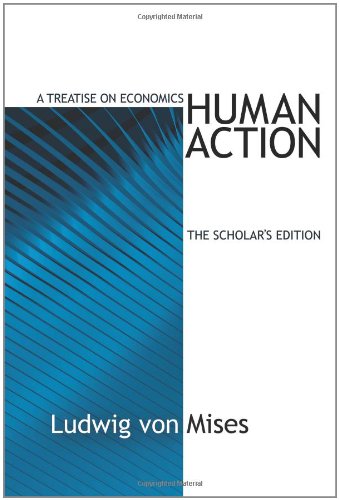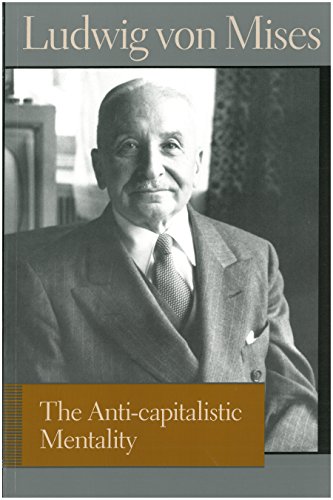In my article on “Civilization and the Faculty Lounge,” I told the story of how New York University’s economics department treated Mises with contempt. The economics department of the University of Chicago did the same with F. A. Hayek, a soft-core version of Mises.
NYU was a third-tier school. Mises was a greater economist than Hayek. The disparity today is obvious. The idea that the long-forgotten drones at NYU thought of Mises as a dinosaur is indicative of just how third-tier NYU was.
 Human Action, The Scho...
Best Price: $10.37
Buy New $40.95
(as of 07:55 UTC - Details)
Mises died in October 1973. In the late spring of 1974, a week-long meeting was held at South Royalton, Vermont. Three dozen young Austrian School grad students plus Rothbard, Kirzner, Hazlitt, and Peterson met together. The following fall, Hayek won the Nobel Prize. The following summer, Hayek joined the faculty of the second Mises seminar.
Human Action, The Scho...
Best Price: $10.37
Buy New $40.95
(as of 07:55 UTC - Details)
Mises died in October 1973. In the late spring of 1974, a week-long meeting was held at South Royalton, Vermont. Three dozen young Austrian School grad students plus Rothbard, Kirzner, Hazlitt, and Peterson met together. The following fall, Hayek won the Nobel Prize. The following summer, Hayek joined the faculty of the second Mises seminar.
In 1982, the Mises Institute was founded. It was dedicated to promoting the work of Mises, Rothbard, and other Austrian School scholars. There is www.Mises.org to draw students from around the world, 24×7.
Where are the institutes for any faculty member of the NYU economics department in Mises’ day? They do not exist. Where are the websites for any of them? They do not exist. Who remembers any of them? No one.
 The Anti-capitalistic ...
Best Price: $6.48
Buy New $18.96
(as of 03:55 UTC - Details)
The Anti-capitalistic ...
Best Price: $6.48
Buy New $18.96
(as of 03:55 UTC - Details)
Mises left an intellectual legacy: a consistent, integrated system of economics. This captured the minds of Rothbard and a few others, such as Hans Sennholz and George Reisman. Rothbard persuaded Lew Rockwell. Rockwell’s sites have have persuaded thousands of others.
Mises is the comeback kid. His colleagues at NYU — with the exception of William Peterson — are deservedly forgotten. They never came back, because they had never been visible enough to establish a stronghold.
 Anatomy of the State
Best Price: $5.00
Buy New $5.82
(as of 05:45 UTC - Details)
They were men of the faculty lounge. They left no traces. They deserved to leave no traces. They collected their paychecks, and they made sure that there was no paycheck for Mises. He worked free of charge — outsiders paid his salary. The hacks in the NYU economics department thought Mises was overpaid. But it was they who were overpaid by the parents of students who did not understand the magnitude of what Mises had done, was doing, and what his ideological heirs would continue to do.
Anatomy of the State
Best Price: $5.00
Buy New $5.82
(as of 05:45 UTC - Details)
They were men of the faculty lounge. They left no traces. They deserved to leave no traces. They collected their paychecks, and they made sure that there was no paycheck for Mises. He worked free of charge — outsiders paid his salary. The hacks in the NYU economics department thought Mises was overpaid. But it was they who were overpaid by the parents of students who did not understand the magnitude of what Mises had done, was doing, and what his ideological heirs would continue to do.
Mises had a philosophy: “Never give an inch.” I discussed this in my article. He was dismissed by Milton Friedman as being unbending to the point of silliness. Mises was not silly. He recognized Friedman’s compromise with welfare state policies — and Hayek’s. He called spades spades.
He had fought in the ideological front lines before World War I. His unbending stand attracted Hayek, Roepke, and a generation of young socialists in the early 1920’s. He moved them closer to the free market than they had
 Against the State: An ...
Best Price: $5.02
Buy New $5.52
(as of 11:35 UTC - Details)
been. But they never came all the way, and some of them defected back part way after The General Theory (1936).
Against the State: An ...
Best Price: $5.02
Buy New $5.52
(as of 11:35 UTC - Details)
been. But they never came all the way, and some of them defected back part way after The General Theory (1936).
Mises was hard core. Rothbard was hard core. Those in between were softer core.
The pleasantries of the faculty lounge keep soft-core people immunized from the harsh reality around them. Tenure offers safety.
Mises never had tenure. He was the man who stood in the gap in the twentieth century. He was the leader at Thermopyolae. Wave after wave of “Persians” attacked, and he held firm. “Never give an inch.”
To understand what he did, and how alone he stood, click the link.




